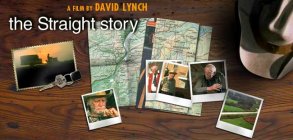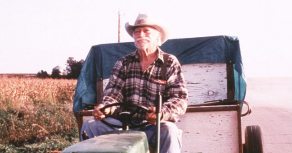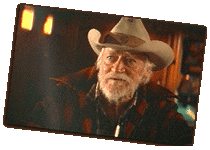The Straight Story (1999)
 Starring:
Richard Farnsworth, Sissy Spacek, Jane Heitz, Everett McGill, Jennifer Edwards,
Barbara E. Robertston, John Farley, John Lordan, Harry Dean Stanton.
Starring:
Richard Farnsworth, Sissy Spacek, Jane Heitz, Everett McGill, Jennifer Edwards,
Barbara E. Robertston, John Farley, John Lordan, Harry Dean Stanton.
Written by Mary Sweeney & John Roach, based on a true story.
Directed by David Lynch.
Grade: A
Review by Dana Knowles.
Alvin Straight (Richard Farnsworth) is a character we
recognize instantly when we see him. He's a good-hearted old coot, living a
placid life in a small town in Iowa with his adult daughter, Rose (Sissy Spacek).
His body is failing him, his eyesight is waning, and he seems more aged than
his 73 years should account for. His face is an intricate tapestry of craggy
wrinkles that are offset by a pair of blue eyes that are nothing short of captivating...
his one feature that transcends the ordinary. Yes, we recognize him. And David
Lynch knows that we will respond to the visual shorthand before us. In fact,
he counts on it. But not in the way that most filmmakers would count on it,
which would be to use our assumptions to advance plot or character development
efficiently. Lynch counts on it because he seeks to reveal the superficial nature
of those assumptions, and the egregiously limited accuracy of what we think
we know when we look at such a man. As the film unfolds, we will come to see
inside of those beautiful eyes the way that Lynch sees inside of them. And we
will come to see the things that those eyes see the way that Straight sees them
(blurry though his vision may be).
Much has been made of the presumed "fact" that this is a non-Lynchian David
Lynch film. But I reject that notion outright. This is every bit a David Lynch
film, despite its apparent departure from the disturbing subject matter and
edgy darkness that his earlier works are known for. As is his habit, Lynch is
aiming to get inside of the world he presents, to take us beneath the surface
and expose its secrets. The only real difference between The Straight Story
and Lynch's more famous works (e.g., Blue Velvet, Wild At Heart) is that
he illuminates this man and his world by allowing them to come to us. Rather
than using his camera to (quite literally) burrow inside of character and setting
and plot, he uses it as a benevolent window that seems to expand incrementally,
progressively broadening and enriching our view. Watching The Straight Story
is like watching a rose bloom in real time... if one could do such a thing without
ever getting antsy, that is. As the story unfolds, our sense of the many forms
of beauty on display grows increasingly vivid and poignant without ever edging
into the realm of sappy or cloying. 
The story--such as it is--involves Alvin's decision to travel several hundred
miles to see his ailing brother, from whom he has been estranged for a decade.
Alvin can't afford to travel by conventional means, and he can't drive because
his license has been revoked due to his poor eyesight. So he sets off for Wisconsin
on the only machine he's legally allowed to operate: his lawnmower. What follows
is a topsy-turvy version of a road movie, wherein the central character is not
(as the convention would normally have it) transformed. Instead, it is Alvin
who transforms the road and the people he interacts with, as well as the audience
that comes along for the ride. Not in an overtly dramatic, earth-shattering
way, but in a quietly affecting one. As you might expect, the structure is episodic,
moving from one locale to the next with Alvin. And though small things do happen,
this is not a film that revels in high drama or wrenching plot twists. Most
of the events depicted could fairly be labeled mundane, which might lead some
to feel that there's no there there. But there is. And Lynch finds the means
to make us see what's there by urging us to slow down our thoughts and settle
into the deliberately languid pace that informs both the narrative and the journey
it depicts. The slow pace of this film is key to a fundamental issue being addressed.
Alvin cannot be in a hurry, so he is not in a hurry. He accepts the terms of
his task, and uses them to whatever advantage is available. Sometimes that advantage
takes the form of an interesting human interaction, and sometimes it merely
provides an opportunity for him to truly see the world he is passing through,
simply by giving him the time to look. 
Farnsworth provides a presence more than a performance (though it is--in truth--a
remarkable performance). His Alvin is a man of few words, plain spoken, kind
without being smarmy, and quiet in his stubborn insistence on doing things his
own way. There are no scenery-chewing moments of intense histrionics for Farnsworth
to latch onto. It is up to us to see beyond the veil of Alvin's seemingly infinite
sense of calm. Farnsworth allows us in, but never fully lets down Alvin's guard.
In other words, it's an honest portrayal of this kind of man. The kind we never
notice. The kind we assume has nothing of interest to tell us or show us. Great
credit is due to both Farnsworth and Lynch for avoiding the trap of having him
metamorphose into a movie character. And for never reaching for a false sense
of intimacy between the audience and Alvin, just to tug more effectively on
our heartstrings. Though Alvin reveals himself and his sorrows and joys through
dialogue exchanged with those he meets, it is always handled in a way that seems
true to the reticent man that he is. He may tell a few tales that are factually
heartbreaking, but Farnsworth never wrings an undue amount of emotion from these
moments to pump up the audience response. Instead, we are asked only to recognize
the greater context within which this man exists. To see him more fully than
he's ever tried to be seen. To see the wall he's built, and not just the cracks
in it that give us a peek at why it existed in the first place. It's an inspired
approach, and a dangerous one. It conveys a sense of trust in the audience that
most filmmakers are loathe to invest. Lynch believes that this man - just as
he is - is worthy of a movie. And he trusts us to recognize why he believes
that. And to recognize why he's right. This little movie is deceptive in its
restraint. It is--in fact--some of the boldest filmmaking of the decade, steadfastly
refusing to fall back on trickery or bombast to insure a common sort of satisfaction.
The supporting cast is perfectly plain. And perfectly perfect. They look and
sound and act like unremarkable, ordinary people. And yet they're never dull.
How did Lynch pull this off? It's odd, to say the least. Sissy Spacek is very
good as Alvin's daughter, Rose... a girl who is--as it turns out--not quite
what she seems at first glance. It's a delight to stumble upon the tiny moments
that soon begin to add up to a character that feels so authentically human.
And it's an equal delight to feel our assumptions crumble away as we share more
time with her. It makes you wonder what you've missed in the people you've encountered
and assessed, but never really known. Her scenes are relatively few, but they
add a layer of meaning that resonates on several levels. Spacek may get some
well-deserved attention for this role despite its limited screen time, if only
because it is so full of surprises. We always remember being surprised, don't
we?
Shot with lavish care by Freddie Francis, the midwest countryside is stunningly
lovely. This is precisely the sort of terrain that we tend to rush through on
our way to somewhere else, but Alvin's sluggish John Deere forces us to look
at where we are. Utterly devoid of drama, the simplicity of this landscape ultimately
takes on the aura of a quiet perfection that borders on the sublime. It isn't
Monument Valley. And that's the point. Just as Alvin isn't movie-star gorgeous
or a dashingly rugged hero. Just as the story being told is not a rollercoaster
thrill-ride. Lynch and Francis ferret out the beauty that we often miss by looking
only at extremes. They honor the ordinary in a way that is extraordinarily tender
and loving. And part of that act of honor is to let it be what it is, unvarnished
and plain... and to allow us the time and the perspective to take a good look.
It's a wonderful achievement, born of an astute and careful employment of film
language. Those who assess Lynch's directorial bent according only to the content
of his stories have missed a crucial fact. He is a brilliant and peculiar visualist.
Those who understand the essence of Lynch's gift will see him all over this
film. His playfulness. His wry sense of humor (believe it or not, the film is
occasionally hilarious). His aesthetic kinks. His passion for the world in all
its glory and ugliness and absurdity. And (no, this is not a typo) his deeply-sincere
idealism. David Lynch is a real world version of the Wes Bentley character in
American Beauty. He sees beauty everywhere he looks. He regards the world
with wonder and curiosity, and he hopes that we'll share his fascination if
he shows us that world through his eyes and ears.
What Lynch gives to us in The Straight Story goes beyond the beauty
of the ordinary. He also conveys the beauty of the human struggle for redemption
and peace... the beauty of simple generosity... the beauty of a gesture that
translates as love in a way that words could never do... the beauty inherent
in our world, upon which we heap needless pain and ugliness in order to protect
things that really don't matter. I can't recall the last film I saw that expressed
this level of tenderness and affection from beginning to end. Gentle, graceful,
and calm, The Straight Story generates the kind of low-key pleasure that
feels like an internalized smile that never quite fades away. There is something
deeply satisfying about residing briefly in the mind and heart of a storyteller
who is in love with both his subject and with the art of storytelling itself.
Lynch's film pays off in ways that are subtle and unquantifiable. By the time
it reaches its conclusion, The Straight Story manages to sneak up on
you and pull you in, making you wonder how a film with so little drama and so
little excitement can possibly feel so oddly, quietly exhilarating. And yet
it does. As Lynch himself might put it, it's a beautiful thing to behold.
Review © October 1999 by AboutFilm.Com
and the author.
Images © Disney Enterprises, Inc. All Rights Reserved.
Send us a comment
on this review. We'll post a link to the best comments!
Visit
the official The Straight Story web site.
Home
 Starring:
Richard Farnsworth, Sissy Spacek, Jane Heitz, Everett McGill, Jennifer Edwards,
Barbara E. Robertston, John Farley, John Lordan, Harry Dean Stanton.
Starring:
Richard Farnsworth, Sissy Spacek, Jane Heitz, Everett McGill, Jennifer Edwards,
Barbara E. Robertston, John Farley, John Lordan, Harry Dean Stanton.
